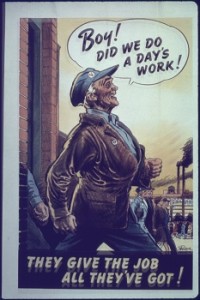 Everyone has pondered the question of how to leave a job, but the more important question is how to leave a job on good terms.
Everyone has pondered the question of how to leave a job, but the more important question is how to leave a job on good terms.
As a man, your relationship with your career might be even more passionate and intense than anything you’ve ever had with a woman. If it’s not, it’s probably the most important thing in your life after your girl. We take our professional lives seriously, until we realize that it’s time to move on — at which point we discover that there’s no blueprint for leaving a job successfully.
But leaving a job is, in many ways, just as important as starting it. (In some cases, it’s even more important.) As we often say at AOC, how you do one thing is how you do everything. The way you wrap up a professional opportunity speaks volumes about how you manage your entire life.
And the stakes are high. A head-hunter friend of mine recently told me that she calls scores of people every day to ask about their past employment, and receives dozens of calls every day from previous employers. While many companies can’t officially give you a bad recommendation, she told me the truth always comes through. “We know when the person wasn’t very good,” she said. “We just do.”
A strong referral, of course, is only part of the equation. How you wrap up a job reflects your character, becomes part of your personal brand, determines future opportunities with the company and your former colleagues, and directly ties to personal happiness and career satisfaction.
And while you won’t always have total control over how things go down at work, you do have complete control over how you behave when it’s time to move on. That, in turn, will shape your reputation. So here are five principles to follow to ensure that you leave your job like a pro, and on great terms. So let’s take a look at how to leave a job on good terms.
Double down on hard work.
Some guys put their notice in and immediately go on a two-week subsidized staycation. That can be tempting (and maybe even deserved), but I suggest that you do the exact opposite.
In your final weeks, see what happens when you knuckle down and put in the hardest work you ever have in your life. As you transition out, you want people walking around the office wondering what the hell this place is going to do after you leave. You want to be the superstar around the office no one thinks they can live without. Making yourself essential is the best form of job security and future demand. It’s not uncommon for rockstars to be hired back with a nice salary bump, perks, and the respect and demand of the company. That only happens if you treat your last two weeks even more seriously than you treated your first.
But the benefits also extend to your next job. When you head into your new role, you won’t have to “ramp up.” You’ll have been rocking and rolling at your old job, using the excitement and exuberance you have for your new job to kill it at your current job. You’ll hit the ground running on that energy and probably have a little more to boot once you start your new gig.
Deepen your relationships.
Few people actually develop strong relationships with their colleagues. Even if they become loose friends, they rarely develop deeper connections. You might get along around the workplace, have a laugh and get together for happy hour now and again, but the only thing tying you together is the company.
Your last couple of weeks at work are the perfect opportunity to change all of that.
Because the people you work with are some of the greatest assets you can inherit. They are the relationships that might land you a future job, the people you might want to bring with you into your new place of work, and the colleagues who know what you’re actually like to work with. If you aren’t tight with your strongest colleagues already, use the end of your job to create those bonds before you leave.
You could grab lunch with someone or a beer after work. If you golf or hike or do some other physical activity, invite them along. Or you might invite them to play poker or watch football or do volunteer work with you. The fact that you’re leaving is the ideal excuse to get together, so use your final weeks to forge those bonds with your most valuable colleagues, and organically cement your reputation with them before you leave.
Mend fences wIth rivals.
But not all colleagues are created equal, and not everyone at work is a close friend. There will always be workplace rivals or colleagues who just rub you the wrong way. I get it — believe me.
It would be so easy — tempting, even — to ignore them outright, or to use your exodus as an opportunity to finally tell them how you feel. Instead, I’m going to suggest that you do the opposite, and try to mend fences with them.
I’m not saying that you should aim to be best friends. (Although there are people in my life I once couldn’t speak to who are now good friends.) Still, you don’t have to be best friends to transform the relationship into something that works for both of you, and might, at the very least, open up new professional opportunities.
Because all things being equal, I want people to like me, and I’d prefer to like them. You never know what the future holds. The person you can’t stand today might be a colleague in the future. They might have a lead on your dream job. Alternately, you might be the one with something to offer them, which could shift the dynamic of the relationship.
So take this opportunity to reconnect. Maybe you’ll have a frank talk about your differences in the past, and you’ll both discover that you’d like to change things going forward. Or maybe you’ll find that there’s nothing new to say, but that you’re both willing to let to go of the past. Either way, in your last few weeks, you have the opportunity to rewrite the terms of the relationship, without the weight of your professional baggage.
Now that you’re not tethered by work, this can be a very liberating conversation. At the very least, it can be rewarding and healthy to know you made the effort.
Offer value to those underneath you.
If you’re in any position of seniority, there will always be people underneath you. It might be a formal reporting relationship, someone who joined the company after you, or even a guy who’s senior to you but whom your coworkers don’t necessarily look to for strong leadership.
One of the best gifts you can give any coworker is value. Making other people look good is always going to make you look good. When you’re on the way to a new job — which, by the way, is a strong reflection of the value you have to offer in general — you have everything to gain by building your colleagues up and offering your help as you leave.
You can do that in a number of ways. You can offer feedback on their performance and reputation, as long as it’s genuine, kind and welcome. You can pass your projects, ideas and initiatives onto someone else, and allow them to inherit the work you’ve done. You can use your leaving as an opportunity to discuss a colleague’s career goals, one of the most helpful conversations two people can share. You might even schedule some time with your boss to share your candid experience at the company, as long as it’s productive. Whatever you do, look for the ways — big and small — that you might add value to your colleagues as you leave.
This is a totally selfless act, but one that frequently delivers massive benefits down the road. It’s the kind of behavior we champion in all relationships — especially professional ones — to build lasting loyalty and deep appreciation.
Leave a good taste in everyone’s mouth.
Before you leave for good, I’d recommend hosting some kind of work event where everyone can have fun. Take the team bowling or out for a drink. Invite them paintballing or surfing. Whatever you choose, create a group activity everyone is going to enjoy, and do it on your dime. This is an investment.
Just as a first impression colors every relationship, a final impression shapes how people remember you. When you work hard, give value and mend fences, you are literally securing a positive memory in the minds of the people you worked with. The memory you are aiming to create is of a guy who is kind, generous, valuable, fun, and ultimately irreplaceable.
And that final impression can now last much longer than your last day of work. With social media, you have the opportunity to represent your employer and stay in touch with your former colleagues forever. Return to these principles again and again, and you’ll find that your network and reputation will last much longer than your role.
As it happens, the same principles that guide a successful romantic break-up also apply to a successful work transition. That’s why The Art of Charm is currently developing something I’m tentatively calling The Grand Unified Field Theory of Ending Relationships. In the coming weeks, I’m going to conect the dots to show you how ending any kind of relationship — professional, personal, romantic, intimate, casual, whatever — is basically flexing the same muscle. Stick around to learn more.
In the meantime, what have you learned from leaving jobs, good and bad? Have you missed opportunities to secure your reputation? Have you wrapped up a job like a boss? Leave a comment below and let’s start sharing some of our most memorable and instructive final moves. Perhaps we can all educate each other on how to leave a job on good terms.



